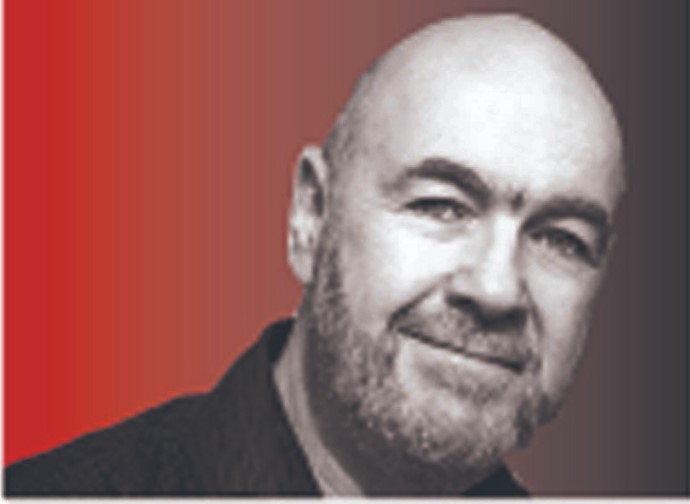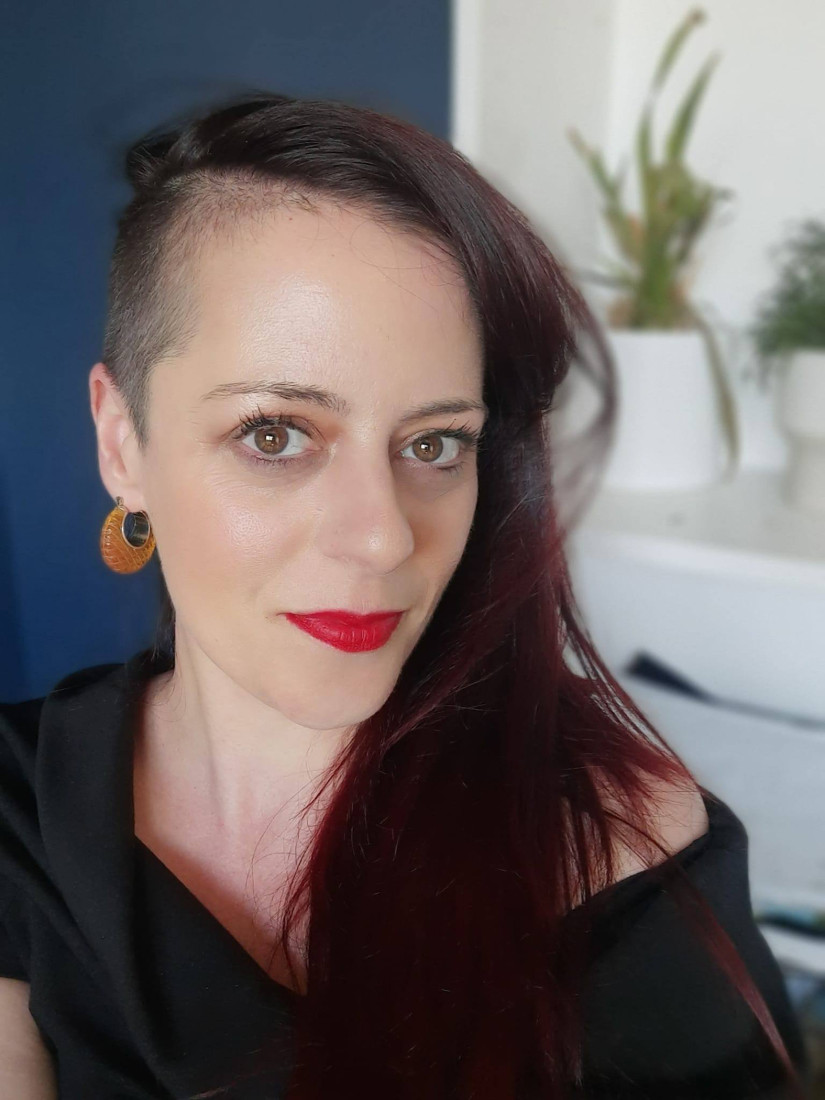In this week’s The Third Degree: award-winning poet Annemarie Ní Churreáin from Cloughaneely shares with us the inspiration behind her work, how she was honoured to edit Poetry Ireland Review and some of the exciting events she has coming up over the summer.
Hi Annemarie, many thanks for agreeing to do this interview. Firstly, how are you?
As my grandmother liked to say, ‘Tá mé na rith mar a bheadh leoraí aráin ann”. I’ll leave that with you to translate! I’m well, thank you, and grateful for every new day.
Does your year have seasons?
Seasons would be ideal but in reality I’ve had to learn how to move, as needs demand, between desk work, book touring and teaching. It’s the nature of being a freelancer; you have to follow the flow. I tend to go off-grid, without apology, every August for deep rest and recalibration – I stay in a remote mountain cottage without electricity in south Donegal. It’s medicine of the purest kind to live by natural light and swim in the nearby bog lake.
Do you prefer the solitude of writing or the group experience of reading?
They’re very different skills.
My first love is the act of making a poem from scratch and the quiet, lovely labour of wrestling with an image, a sentence, a word. The craft of poetry is at the centre of my world but I genuinely enjoy all the other parts of the writing life including readings and touring. Reading poetry aloud connects me back into a long tradition in Ireland of carrying the poem on breath. In this tradition breath and body become part of landscape, become extension of place, become ritual. In my work I am often asking what is the political power of the embodied poem? What is the power of the poem in a public place? And what does it mean, to stand on a stage, and breathe, with my body, images of historical loss and survival, out of my self and into air?
Is the task of editing a magazine like Poetry Ireland Review a pleasure or a terror?
Honestly, it’s a real honour to serve as an editor. The original Poetry Ireland Review appeared in 1948 and so it’s much more than a literary journal, it’s a long-held tradition. To have work published in the review is a big occasion for many poets. I never expected to find myself in the role of editor but I’ve discovered it suits my sensibility perfectly. I grew up as the eldest in a large family and I learned, early on, how to manage space. I’m the type of person who likes everything to be in its right place and there’s great satisfaction in finding the space where a poem, or a word, belongs. Naturally, that editorial work also nourishes my own practice of writing.
How do your ideas come to you – is there a specific theme already in your mind, or do individual lines pop into your mind that need fleshing out?
Inspiration can come from anywhere but most of my new poems take root when I’m in the rural landscape. I grew up in the boglands of the Gaeltacht and my language remains absolutely entwined with place. As a child I did not have regular access to libraries or bookshops but I did have lots of early exposure to legends, mythology and the landscape as a canvas inscribed with shadows and echoes. My earliest books were prayer books and, in fact, my first poem at the age of twelve in a small, glossy Catholic pamphlet called ‘The Messenger’! I’ve since set aside my religious beliefs but that earth-heart connection remains vital for me today. You can never really leave the bog; it stays with you your whole life. During walks I’ll write in a notebook and then, at some stage, once time has been found, I transfer my handwritten notes to my MacBook and at that point the long process of editing begins.

Paul Bradley
And is there something in particular from which you draw inspiration?
Much of my poetry to date has explored the theme of family. Bloodroot (Doire Press, 2017) references a family connection with the mother and baby homes in the 1950s and, in that same book, I draw from my own experiences of being raised in a family that fostered children. The silence around mother and child separation is a silence I often return to. The American poet Louise Glück once said “we look at the world once in childhood and the rest is memory” and that idea has informed my own writing greatly.
More recently, in The Poison Glen (Gallery Press, 2021), the writing draws from an auspicious Donegal beauty-spot associated with Balor of The Evil Eye who is said to have locked his daughter Eithne into a tower on Tory Island and stolen her three infant sons. According to popular retellings, Lugh, the only surviving son, returned from fosterage as an adult to slay Balor by striking him in the eye and causing a poison to spill through the glen. It’s a story of family splits and wounds and in my version I was keen to acknowledge female viewpoints by inhabiting the voices of Eithne, Eithne’s handmaid, and Eithne’s mother.
Your poetry often explores the lives of women and children, their relationships, and the wrongs that have been done to them. Is that a particularly rich seam in Ireland?
Well, you might say that I have an ever-evolving interest in the ‘Irish’ identity forged for us by church and State. In both my collections there are lots of poems that seek, in various ways, to unpack the cost of that forged identity for women and children. But that said, poetry is always personal for me before it is political. The fact is that I first came to language at a time in Irish history where a silence around the lives of women and girls was beginning to break. 1984 was the year I went to school and that was the same year in which Anne Lovett died, The Kerry Babies story unfolded and teacher Eileen Flynn lost her job for ‘living in sin’. You might wonder what, if anything, a ‘naíonán bheag’ could know about this social climate, and it would be reasonable to conclude that a child knows very little. All the same, these narratives were in the air. Osmosis is a fact of poetry and what you breathe in, you breathe out.

Annemarie Ní Churreáin from Cloughaneely
Which poets do you return to yourself?
Every phase of my life brings a renewed sense of connection with my favourite poets. Whilst writing a long poem about the famed Dublin Foundling Hospital of the 1700-1800s I spent a lot of time with the work of Patrick Kavanagh trying to understand how he excavates such light from dark histories. I’m a long-time admirer of poet Pearse Hutchinson who wrote eloquently of his quest in writing ‘for true gentleness’ and when I want to remind myself of what courage looks like in a poem I turn to the collections of Leland Bardwell. Right now I’m obsessed by the ghosts of Nuala Ní Dhomhnaill’s poetry and by the famed Mrs Halpin figure in the poems of Michael Hartnett. I’m also reading a lot of material by Native American poets.
Has social media democratised poetry, or made it too easy?
It’s a two-fold situation for poets, I think. On the one hand social media has opened out the poetry world, giving poets on the margins access to material, resources, conversations and opportunities; on the other hand, it’s part of a world of distraction which is detrimental to the art of close and meaningful observation. It think it’s up to poets, in the same way that it’s up to everyone, to become skilled in the healthy use of social media. The antidote to the impersonal nature of social media space is, I think, the ritualisation of your actual writing space. I write at home in a room on a simple self-assembled birchwood desk made and bought locally. In Irish folklore birch is strongly associated with love and protection. I make conscious efforts to neutralise the harmful effects of spending too much time online.
Has poetry generally been revitalised lately? Is it still almost impossible to make a living from just writing it? I remember seeing Thomas Kinsella say he was content to sell 300 copies of a book of poems.
Ireland has always held a special place for poets but yes, in general, there does seem to be a refreshed excitement about poetry among younger generations. Certainly, technology has given us new tools to enjoy poetry, and increased cultural diversity in Ireland has alerted us, in new ways, to possibilities of language. Can a poet make a living from poems alone? Possibly not and yet writing poetry doesn’t happen in a vacuum; it happens within a thriving infrastructure of publishing, festival and teaching engagements. So, yes actually, in the end it is possible to make a living as a poet in Ireland. I have a deeply practical attitude towards that side of things. Like many Donegal creatives, I come from people who raised large rural families on the back of hard work. Surviving as an artist is not easy but it has been my experience that actually, with a little grit, and a lot of focus, you can thrive.
My opinion is this: there is no right or wrong way of being a poet. Kinsella worked a 9-5 job for almost twenty years but Kinsella would have different options if he was starting out today. Overall, the arts have become more professionalised over the past few decades. Happily, we have more choices. Think of Leland Bardwell, born in the ‘20s, later trying to raise a brood of children on her poetry income. The Unmarried Mother’s Allowance didn’t exist until 1973! In particular, a female writer now has freedoms, of different kinds, and those freedoms make a life of writing more possible.
Any pending plans or publications on the way?
I have had the pleasure of being the 2022-2023 Decade of Centenaries Poet in Residence at Donegal County Archives Service and I’ll be launching a new pamphlet of poems inspired by Stranorlar Workhouse (later Stranorlar County Home) at the 2023 Frances Browne Festival. I am also buckling in for a busy summer and Autumn of readings in the U.S., Mexico and Lithuania. But, best of all, I’ll be hosting a poetry workshop as part of the new Bród Festival in Cloich Cheann Fhaola on July 19 and I’ll be reading at Earagail Arts Festival for a special event titled ‘Telling The Whole Story: Taking Our Place’ at Rathmullan House on 23 July 2023.
Receive quality journalism wherever you are, on any device. Keep up to date from the comfort of your own home with a digital subscription.
Any time | Any place | Anywhere









